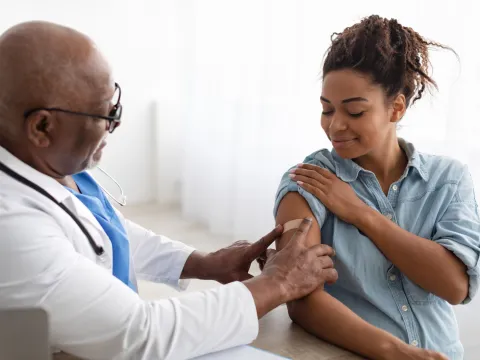- AdventHealth

Choose the health content that’s right for you, and get it delivered right in your inbox.
Now that fall is in full swing, you might be wondering which vaccinations to get this cold and flu season. Although the COVID-19 public health emergency is over, the virus itself is still here — and not likely going away anytime soon. That’s why the Centers for Disease Control and Prevention (CDC) recommends everyone 6 months and older get an updated COVID-19 vaccine.
Why the COVID-19 Vaccine Is Still Important
Getting vaccinated is still the best way to protect yourself from serious illness from the coronavirus, which is constantly changing. When you get an updated vaccine, you strengthen your immune system against the variants currently causing the most infections and hospitalizations in the United States.
According to the CDC, people who received last year’s COVID-19 booster were better protected against illness and hospitalization than those who didn’t get it. But even if you were vaccinated in the past or received boosters, your immunity has likely declined. The new shot is your opportunity to strengthen that immunity, and is especially critical for those who are older, have chronic medical conditions or whose immune systems are compromised.
Getting vaccinated also reduces your risk for long COVID, which causes long-term effects from the infection and lasts for weeks, months or even years. Plus, the shot available this fall is less a booster than an actual vaccine, meaning that unlike last year’s shot, it doesn’t protect against the original strain of COVID-19 or early Omicron variants, like BA.5. Instead, it’s specifically formulated to target the XBB.1.5 Omicron subvariant, which made up most COVID-19 cases early in 2023, as well as protect against related subvariants, like EG.5, another dominant and fast-spreading strain.
When and Where to Get the Shot
If you haven’t received a COVID-19 vaccine or booster in the past two months, the CDC recommends getting the updated vaccine now, in the fall. That means you’ll receive one of two mRNA vaccines approved by the Food and Drug Administration (FDA) — one made by Moderna or one made by Pfizer-BioNTech. The FDA is still reviewing a protein-based vaccine from a third drug maker, Novavax.
The CDC says the COVID-19 and flu vaccines are safe to get together, so you can receive both shots at the same visit. And most health insurance plans will cover the COVID-19 vaccine, meaning it’s free to you. If you don’t have health insurance — or you have health insurance that doesn’t cover the cost — many local health centers offer them for free. To find COVID-19 vaccine locations near you, search vaccines.gov.
Free At-Home COVID-19 Tests
Every U.S. household is once again eligible to receive four free at-home COVID-19 tests by mail. The rapid antigen tests are available on the government’s dedicated site for COVID-19 tests. You can order the tests online.
You can also find COVID-19 testing information, FAQs, helpful articles and more on our COVID-19 resource hub, and learn about our on-demand care, including our emergency and urgent care locations, on our website.


